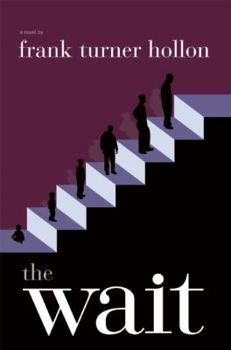The Wait
Select Format
Select Condition 
Book Overview
In the tradition of Philip Roth s" "Everyman, and in a voice that is unmistakably Frank Turner Hollon s, the story of one man contemplating the nature of life the ordinary and extraordinary moments,... This description may be from another edition of this product.
Format:Paperback
Language:English
ISBN:1596922931
ISBN13:9781596922938
Release Date:June 2008
Publisher:MacAdam/Cage Publishing
Length:370 Pages
Weight:0.92 lbs.
Dimensions:1.1" x 5.1" x 8.0"
Customer Reviews
4 ratings
Look at Yourself, Reading Wait
Published by Thriftbooks.com User , 15 years ago
Wait is a worthwhile novel from an interesting mind, that will make you think about your soul, and the state of it, and the reasons why your soul may be in that state. It will make you look around your life with a new, healthy suspicion, and try to imagine your spouse with a gun in his hand, standing there blankly, ready to pull the trigger.
The Wait is worth it.
Published by Thriftbooks.com User , 16 years ago
Can't go wrong with this book. Far from a lighthearted read, it is well written and flows from chapter to chapter and before you know it, your at the end. A lot like life. Anyone adult should enjoy this book. Get it, read it, and then sit and think about your life and what it means to you.
A relentless and glorious page turner
Published by Thriftbooks.com User , 16 years ago
The Wait----which could have easily been called "The Weight" -- is one of the best books I have read in the last ten years. It follows Early Winwood from conception to death, layering bawdy anecdotes over Early's harrowing choices, trying to calculate the value of redemption. Hollon generally writes ambitious, smart, layered novels with the kind of thematic focus that fans of John Updike and Robert Penn Warren will appreciate, and THE WAIT may be well be his finest work to date.
A slow but ultimately rewarding description of a single life, well-lived
Published by Thriftbooks.com User , 16 years ago
In THE WAIT, Frank Turner Hollon abandons all glossy writing, extraneous poetics, rough-and-tumble grittiness and sly minimalism. He is solely interested in relating bare honesty to his readers --- to show what an honest account of a man's life must consist of. His answer, as suggested by the title, isn't the large events that string the "plots" of our lives together --- it's the moments in between, where we digest what has happened, how we should consider ourselves in light of our actions, and how we cope with being changed and unchanged. James Early Winwood's narrative is a confession of sorts, but not told for any need to get a burden off his chest. Placidly, his life is revealed to us in four parts: his teenage years and college experience, young adulthood, middle age, and growing old. Each part consists of relating a series of plot points and pondering their depth: "There is so much to notice if you know what to look for. So much to be aware of around you." He attempts to make this point very early on, to make his project clear for the rest of the novel. His discussion of fishing --- where he claims that rather than catching a fish, "the importance seemed to lie in the silence" --- doesn't leave much to the imagination. Probably Hollon's most remarkable way of achieving this so-called narrative of silence is through his descriptions via negation. To convey the power of emotions, he describes their indescribability; instead of facing up to the truth or to awkwardness, his characters blurt out statements, the banality of which exposes the depth of their feelings. Other times their silence speaks more than their dialogue. While it could be argued that this is just a cop-out way of generating emotional intensity with little real work --- and sometimes it feels that way --- it also does a wonderful job at pulling the double duty of conveying the theme while also painting an emotional portrait. That being said, the novel is fraught with several flaws. While the story progresses naturally, the way it is told (plot and intermission, repeat) is tiresome and uninventive. It also appears to question the very premise of the work, which seems like it ought to be dedicated to a microscopic analysis of tiny, insignificant moments. Instead, the plot-based narrative tells a story with much less rumination than would be expected. And while we get fairly good insight into Winwood's psychology, the reader may be left wanting more. The impact of these issues will ultimately be decided by the reader's tolerance for slow pacing and repetitive storytelling, especially if one is willing to sort out the gems of concise, powerful prose that are scattered throughout the novel. But a more fundamental problem is its uninventiveness. Thornton Wilder covered much of this topic 80 years ago with OUR TOWN, and THE WAIT contributes little new material to the subject. It's primarily concerned with stating its point --- again, with utmost honesty --- but little else. Never





